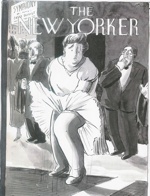
Françoise Mouly is one of my heroes. She and her husband Art Spiegelman published RAW, an astounding large-format comic book that was a big inspiration to me when I started bOING bOING as a print zine in 1988. (I'm still waiting for a full-size hardback that reprints the first 8 issues of RAW, Volume 1). For the last 20 years, Françoise has been the art editor of The New Yorker.
Blown Covers: New Yorker Covers You Were Never Meant To See is her new book. It's a collection of New Yorker covers that were either rejected, caused an outrage, or have an interesting story behind them.
Of the cover above, Françoise says, "In 1993, we published this cover by David Mazzuccelli as the trial of the four men suspected of the bombing of the World Trade Center got underway. There were bomb threats to the magazine, and the image was vehemently denounced — at the time, most in the media were weary of labeling the men involved as Arab or Muslim terrorists."
Below, 11 more covers and cover concepts for The New Yorker, with commentary by Françoise Mouly.

We asked Chris Ware, who drew this week's cover, "Mother's Day," to discuss the New Yorker covers that inspired him. He wrote a charming ode to the women artists of The New Yorker, where he confessed to having "a soft spot for Gretchen Dow Simpson's blank observations of beaches, grass, and whitewashed homes — the peopleless screen doors, walls, shingled roofs, and beach pebbles of the nineteen-seventies and eighties."

Each cartoonist I work with has his own approach and understanding of what makes a good
New Yorker cover. In 1993, Tina Brown, who was only the 4th editor since 1925, turned to
cartoonists like Art Spiegelman to revitalize the magazine. This was Art's published Mother's
Day cover at a time when tattoos were becoming widespread.

A few years later, Spiegelman offered this other sketch for a Mother's Day image—it didn't
get approved.

Sometimes it looks like an artist is poking fun at the more sedate New Yorker covers. This was proposed by M. Scott Miller, years before Janet Jackson's wardrobe malfunction. He claims that the inspiration for this jeté is an experience familiar to anyone who follows classical ballet.

 Cartoonists use clichés, but a good image will use clichés and well-known images to say something new. Harry Bliss make us realize that, sadly, time passes (left). When female bombers made their appearance in the news, in 2002, Danny Shanahan used the same trope to make an entirely different point (above).
Cartoonists use clichés, but a good image will use clichés and well-known images to say something new. Harry Bliss make us realize that, sadly, time passes (left). When female bombers made their appearance in the news, in 2002, Danny Shanahan used the same trope to make an entirely different point (above).

"I have an idea for a back‐to‐school issue," said Anita Kunz back in 1998, "It's Monica Lewinsky sucking a 'Presidential' lollipop… It could be drawn in crayon, very child‐like. Please let me know if you can use it." Once the artist has a good idea, she can strengthen her point with the style she uses to render it.

At the height of the Lewinsky affair, Art Spiegelman proposed this sketch titled 'Clinton's Last Request.' "When a word like 'blow job', which you never dreamt of finding in the paper is on the front page every day," he explains, "I had to find a way for my image to be as explicit without being downright salacious."

In a sketch that Art Spiegelman proposed during George W. Bush's first term, King's dream becomes a nightmare as black leaders like Colin Powell and Condoleezza Rice provide cover for George W. Bush.

In the fall of 2005, videos began making the rounds showing what happens when pieces of Mentos candy are dropped into bottles of Diet Coke. Barry Blitt first tried his idea with two children or two businessmen before finding the right and frightfully funny combination—two Arab men. All versions make fun of terrorism, but only that one makes fun of our own fears.

As of this week, the Freedom Tower has now become the tallest building in New York City — and the third tallest in the world. Speaking of my own personal fears, we'll be moving into that tower in 2014. Back in 2002, when models of the projects for the World Trade Center site were put on display, Blitt sketched Osama bin Laden and his second-in-command reviewing the proposed designs.

When this image by Barry Blitt came in, David Remnick, the editor who makes all the final decisions was o on a trip, but he asked me to show it around. My colleagues, all word people, laughed heartily yet they concluded it didn't 'work' because neither the Pope nor the scandals plaguing the Catholic Church had anything to do with Marylin Monroe. "Oy vey!" said the artist, Barry Blitt, and we moved on.
Buy Blown Covers: New Yorker Covers You Were Never Meant To See on Amazon





